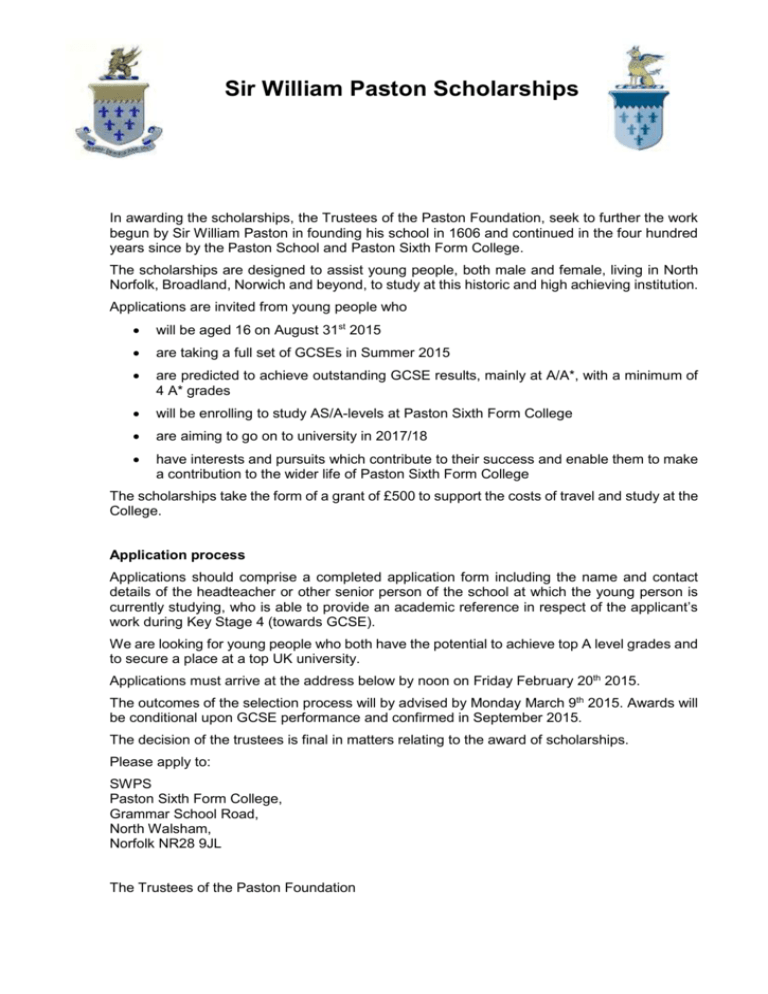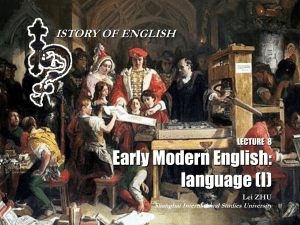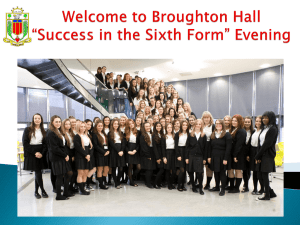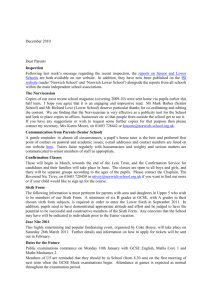Sir William Paston Scholarships
advertisement

Sir William Paston Scholarships In awarding the scholarships, the Trustees of the Paston Foundation, seek to further the work begun by Sir William Paston in founding his school in 1606 and continued in the four hundred years since by the Paston School and Paston Sixth Form College. The scholarships are designed to assist young people, both male and female, living in North Norfolk, Broadland, Norwich and beyond, to study at this historic and high achieving institution. Applications are invited from young people who will be aged 16 on August 31st 2015 are taking a full set of GCSEs in Summer 2015 are predicted to achieve outstanding GCSE results, mainly at A/A*, with a minimum of 4 A* grades will be enrolling to study AS/A-levels at Paston Sixth Form College are aiming to go on to university in 2017/18 have interests and pursuits which contribute to their success and enable them to make a contribution to the wider life of Paston Sixth Form College The scholarships take the form of a grant of £500 to support the costs of travel and study at the College. Application process Applications should comprise a completed application form including the name and contact details of the headteacher or other senior person of the school at which the young person is currently studying, who is able to provide an academic reference in respect of the applicant’s work during Key Stage 4 (towards GCSE). We are looking for young people who both have the potential to achieve top A level grades and to secure a place at a top UK university. Applications must arrive at the address below by noon on Friday February 20th 2015. The outcomes of the selection process will by advised by Monday March 9th 2015. Awards will be conditional upon GCSE performance and confirmed in September 2015. The decision of the trustees is final in matters relating to the award of scholarships. Please apply to: SWPS Paston Sixth Form College, Grammar School Road, North Walsham, Norfolk NR28 9JL The Trustees of the Paston Foundation History Sir William Paston founded his school in North Walsham in 1606. Sir William died in 1610 and the Trustees, created by his will, have continued to support education in Norfolk in the four centuries since. The trustees own two of the College’s three sites and are represented on the College’s Board of Governors (Corporation). One trustee is nominated by the Crown, through the aegis of the Lord Lieutenant of Norfolk and another by the Lord Bishop of Norwich. The remaining trustees are nominated by the Society of Old Pastonians, so continuing that historic link. During most of the 400 years the role of the trustees was to support the Paston School. Paston began life as Sir William Paston’s Free School, essentially a grammar school for boys, which sent pupils on to Gonville College Cambridge from an early date. Most of its pupils boarded at the school. The coming of the railways saw the size of school grow rapidly given North Walsham’s links to the network and so began the tradition of daily travel to attend the school, and incidentally the development of North Walsham as a centre for education serving the area. The North Walsham High School for Girls, the grammar school for girls in North Norfolk, was created around the turn of the twentieth Century to complement the work of Paston. The Twentieth Century brought radical changes to education in Britain, with the 1902 and 1944 Education Acts. Paston became part of the education system provided by the Local Authority, first as a voluntary aided and then as voluntary controlled grammar school for boys’. In all guises pupils travelled to study at the Paston School from considerable distances and some students boarded until the 1950s. In 1984 the Paston School merged with the North Walsham High School for Girls to become the present sixth form college, dedicated to working with young people aged 16 -18. The Trust’s charitable scheme was redefined so that today its purpose is to support the work of Paston Sixth Form College and its students, both male and female. In institutions of such age there have been many students who have gone on from the schools and indeed the College to figure prominently on the local and national stage, in so many different fields. These are too numerous to list but two stand out from the distant past Thomas Tenison (1637-1715), Archbishop of Canterbury (1695 to 1715) during the reigns of William and Mary, Queen Anne and George I. Horatio Nelson (1758 -1805) who was at the school from 1768 to 1771, immediately prior to joining the Royal Navy. and more recently : Baroness Shepherd (former Secretary of State for Education) BBC TV journalist Carole Walker Colonel James Woodham MC, Royal Anglian Regiment, awarded the Military Cross in peace time in 2006 for gallantry Professor David Chiddick CBE, lately Vice Chancellor of the University of Lincoln Charlie Hall, Deputy Chief Constable, Norfolk Constabulary Stephen Fry, British actor Paston Sixth Form College Paston Sixth Form College is a successful sixth form college. Sixth form colleges are regarded as the outstanding model of sixth form in England. David Bell, the former head of Ofsted has written “the consistent success of sixth form colleges is one of the glories of the education system They have very impressive student achievement and pass rates Large numbers of students going on to university. Research conducted recently by UCAS showed that although only 1 in 20 students take A levels in a sixth form college, 1 in 5 undergraduates studied their A levels at a sixth form college. Around 75% of A level and Btec National students at Paston apply to university each year and in 2012 went on to 70 UK universities They can offer much wider choice of courses and combinations than school sixth forms / centres because of their size. Paston at 750 is fairly small as a sixth form college but large compared with a school sixth form. Paston offers around 100 courses and a huge number of combinations in which to study these. The “extras” they offer which enhance the student’s experience of post-16 study: dedicated student support, expertise in guidance e.g. in applying to university, enrichment activities in e.g. sport and fitness, the arts and the value added to study, through trips and visits. Sixth form colleges concentrate all their energies on working with young people aged 1618, they are truly specialist colleges with very well qualified and experienced teachers, working in specialist facilities, who teach their academic specialisms. They have a strong and highly supportive ethos which encourages young people to be ambitious, to aim high and to work hard to realise their ambitions. Sixth form colleges provide a rich social environment for young people as they develop into adulthood. They provide a bridge between school and university. Paston Sixth Form College is measured against the very high benchmark of sixth form colleges nationally. Following an excellent Ofsted Report in 2008 which said that Paston was a successful college, with much that was outstanding, well managed and improving year on year Paston was inspected again in 2011. Inspectors said “Paston’s ambition to raise aspirations is outstanding … staff are united in striving for excellence”. You can read a summary of the report or the full report on www.paston.ac.uk. There are only 94 sixth form colleges in England and only two in Norfolk - Paston Sixth Form College in North Walsham and East Norfolk Sixth Form College in Gorleston, although it is not uncommon for schools to refer to their sixth forms or general FE colleges their A level departments erroneously in this way. Beyond Norfolk the nearest sixth form colleges are in Suffolk, Cambridge and Essex. Sixth form colleges were awarded a legal status, distinct from FE Colleges and Schools, by the Apprenticeship, Schools, Children and Learning Act (2009) The 2015 Prospectus tells you more about Paston Sixth Form College – the courses we offer and the many advantages of being a student at this historic and high performing college. You can keep in touch with College news also by visiting our website (www.paston.ac.uk) and our Facebook page (www.facebook.com/PastonSixthFormCollege). We welcome visits to the College by prospective students and their parents and we offer Taster Days and Open Evenings. Please visit our website for further details. North Walsham enjoys good road and rail transport links. Results Headlines 2014 A Level A* - E 97.3 [97.6] [97.1] A* - C 70% [72.0] [70.0] A*-B 43.0 [48.0] [45.0] 20 [18] [17] subjects achieved 100% A - E pass rate 15 [17] [15] subjects better than 70% A - C grades 7 [5] [6] subjects achieved over 50% A*-B pass rate 90 Norfolk Scholars - outstanding individual achievement of ABB or better or Triple * Distinction at BTEC AS Level A - E 87.0 [89.7] [88.1] A - C 57.0 [61.0] [59] 16 [21] [18] subjects achieved 90%+ A-E pass rate 16 [17] [17] subjects better than 60% A - C Over the last six years Paston's AS performance is "outstanding or excellent", in the top 15% of schools and colleges nationally.[ALPS] BTEC National 100% [100%] pass rate with 71% [68] distinction/merit 24% of BTEC students achieved triple star Distinction grades Value Added in 2012 was “outstanding”, in the top 10% nationally [ALPS] Notes 1 ALPS draws on the DfE’s national database and assesses the performance of students at AS and A based on their GCSE results. At Paston students achieve much better A and AS grades than nationally would be predicted from their GCSE results. 2. 2013 and 2012 performance in brackets Sir William Paston Scholarships Application form Name of student Address …………………………………………………. ……………………………………………………………… ………………………………………………………………. ……………………………………………………………….. Post code ………………………………….. Telephone ………………………… Email……………...…………………. Name of parent / guardian Address ……………………………………………………………… if different ………………………………………………………………. ……………………………………………………………….. Post code Telephone Current school ………………………………….. Email …………………………………………………………………… Address Name of headteacher or other academic referee (please provide contact details) ………………………………………………………………………………………… Predicted grades Summer 2015 (or GCSE subjects taken) Subject 1 English Language 2 Mathematics 3 4 5 6 7 8 9 10 11 12 predicted grade date What AS/A-level subjects do you hope to study at Paston 1 2 3 4 Personal statement In no more than 500 words tell us why you think you should be considered for a scholarship. We are interested to learn about you and your interests, why you have chosen the subjects you intend to study at Paston and your ambitions for the future. What do you think that you can bring to Paston Sixth Form College ? Please write no more than 500 words) Please continue overleaf if necessary.







